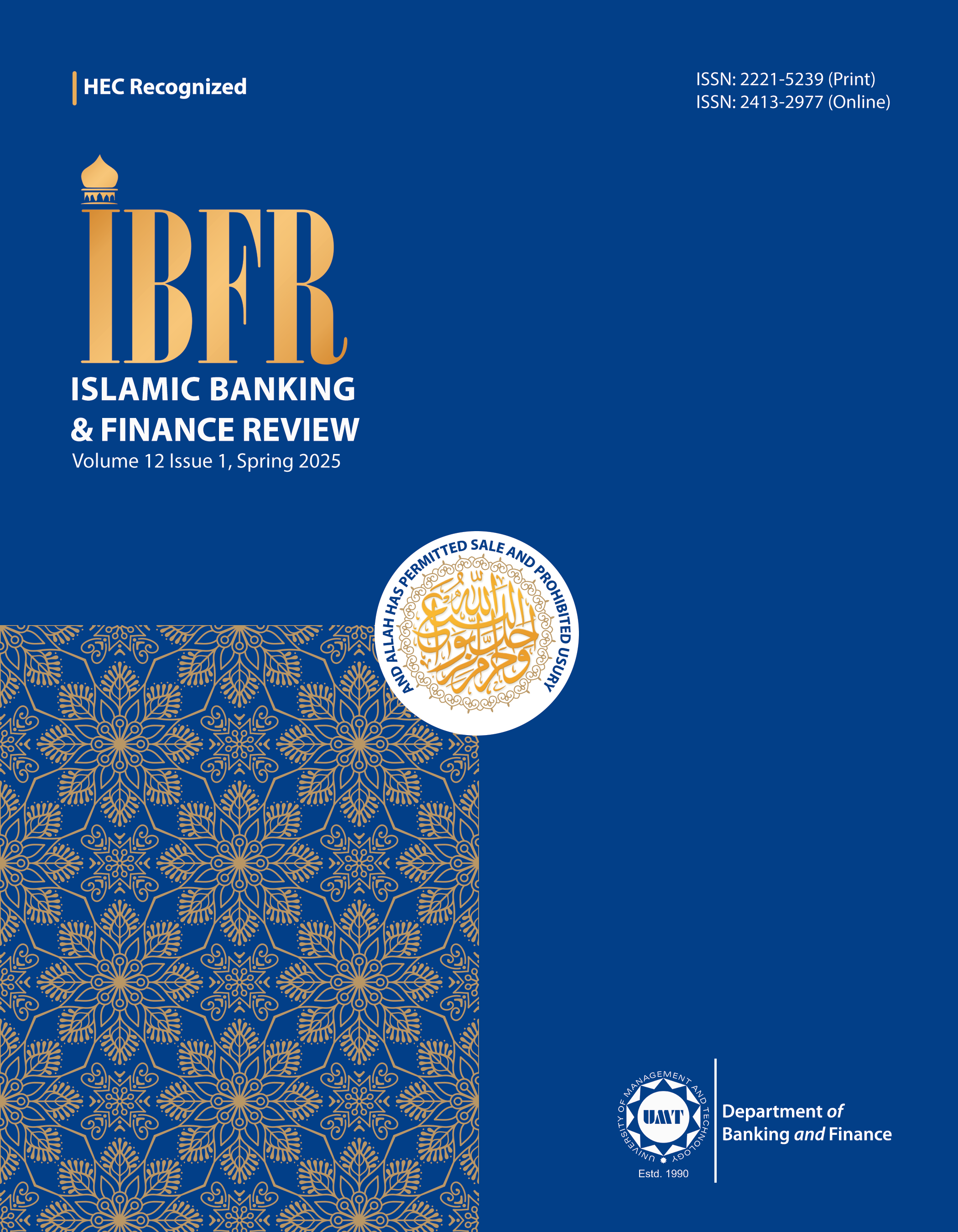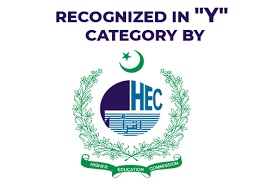Impact of Fintech Adoption, Green Innovation, and Green Finance on Environmental Performance: Evidence From Pakistani Islamic Banks
Abstract
 Abstract Views: 0
Abstract Views: 0
Guided by the resourced-based view (RBV) and the stakeholder theory, this study is motivated to examine the impact of fintech adoption (FA), green innovation (GI), and green finance (GF) on the environmental performance (EP) of Pakistani Islamic banks (IBs).A quantitative research methodology was adopted, employing a structured questionnaire to collect data from 209 bank managers, operations managers, and financial analysts. The respondents were selected using the stratified random sampling technique from the IBs operating in four major cities of Punjab, Pakistan, namely Lahore, Sialkot, Gujranwala, and Gujrat.SEM results confirmed that fintech adoption significantly enhanced environmental performance (β = 0.372, p = 0.000), implying that digital banking reduces resource consumption and improves operational efficiency. Green finance was also found to be a strong predictor of environmental performance (β = 0.426, p = 0.000), suggesting that financial institutions investing in green projects achieve better sustainability outcomes. Among the three independent variables, green innovation exhibited the highest impact on environmental performance (β = 0.498, p = 0.000), emphasizing the role of paperless banking, energy-efficient infrastructure, and sustainable financial practices.The findings underscore the critical role of fintech-driven financial solutions, green banking innovations, and environmentally responsible investments in enhancing sustainability in the Islamic banking sector. Policymakers should develop regulatory frameworks and provide incentives to encourage banks to promote green financial services and sustainability-driven fintech solutions. Future studies should conduct cross-country comparisons, adopt longitudinal designs, and explore moderating variables, such as government regulations and corporate governance structures This study examines the combined impact of fintech adoption, green innovation, and green finance on the environmental performance of Pakistan IBs, an area with limited empirical evidence.
Downloads
References
Ahmed, D., Hua, H. X., & Bhutta, U. S. (2024). Innovation through green finance: A thematic review. Current Opinion in Environmental Sustainability, 66, Article e101402. https://doi.org/10.1016/j.cosust.2023.101402
Akhtar, S., Li, C., Sohu, J. M., Rasool, Y., Hassan, M. I. U., & Bilal, M. (2024). Unlocking green innovation and environmental performance: the mediated moderation of green absorptive capacity and green innovation climate. Environmental Science and Pollution Research, 31(3), 4547–4562. https://doi.org/10.1007/s11356-023-31403-w
Allahham, M., Sharabati, A., Almazaydeh, L., Shalatony, Q., Frangieh, R., & Al-Anati, G. (2024). The impact of fintech-based eco-friendly incentives in improving sustainable environmental performance: A mediating-moderating model. International Journal of Data and Network Science, 8(1), 415–430.
Betts, T. K., Wiengarten, F., & Tadisina, S. K. (2015). Exploring the impact of stakeholder pressure on environmental management strategies at the plant level: What does industry have to do with it? Journal of Cleaner Production, 92, 282–294. https://doi.org/10.1016/j.jclepro.2015.01.002
Bhuiyan, M. A., Rahman, M. K., Patwary, A. K., Akter, R., Zhang, Q., & Feng, X. (2024). Fintech adoption and environmental performance in banks: Exploring employee efficiency and green initiatives. IEEE Transactions on Engineering Management, 71, 11346–11360. https://doi.org/10.1109/TEM.2024.3415774
Bukhari, S. A. A., Hashim, F., & Amran, A. (2020). The journey of Pakistan’s banking industry towards green banking adoption. South Asian Journal of Business and Management Cases, 9(2), 208–218. https://doi.org/10.1177/227797792090530
Cohen, J. (1988). Statistical power analysis for the behaviors science (2nd ed.). Laurence Erlbaum Associates, Publishers.
Comrey, A. L., & Lee, H. B. (2013). A first course in factor analysis. Psychology Press.
Guang-Wen, Z., & Siddik, A. B. (2023). The effect of Fintech adoption on green finance and environmental performance of banking institutions during the COVID-19 pandemic: The role of green innovation. Environmental Science and Pollution Research, 30(10), 25959–25971. https://doi.org/10.1007/s11356-022-23956-z
Hair, J. F., Risher, J. J., Sarstedt, M., & Ringle, C. M. (2019). When to use and how to report the results of PLS-SEM. European Business Review, 31(1), 2–24. https://doi.org/10.1108/EBR-11-2018-0203
Hassan, M. S. (2023). Dynamics of employee motivation and employee performance in banking sector. Business Review, 18(2), 32–50. https://doi.org/10.54784/1990-6587.1580
Hidayat-ur-Rehman, I., & Hossain, M. N. (2024). The impacts of Fintech adoption, green finance and competitiveness on banks’ sustainable performance: Digital transformation as moderator. Asia-Pacific Journal of Business Administration. Advance online publication. https://doi.org/10.1108/APJBA-10-2023-0497
Hsu, C.-C., Quang-Thanh, N., Chien, F., Li, L., & Mohsin, M. (2021). Evaluating green innovation and performance of financial development: Mediating concerns of environmental regulation. Environmental Science and Pollution Research, 28(40), 57386–57397. https://doi.org/10.1007/s11356-021-14499-w
Hu, Z., Ding, S., Li, S., Chen, L., & Yang, S. (2019). Adoption intention of fintech services for bank users: An empirical examination with an extended technology acceptance model. Symmetry, 11(3), Article e340. https://doi.org/10.3390/sym11030340
Hussain, S., Rasheed, A., & Rehman, S. U. (2024). Driving sustainable growth: exploring the link between financial innovation, green finance and sustainability performance: Banking evidence. Kybernetes, 53(11), 4678–4696. https://doi.org/10.1108/K-05-2023-0918
Jan, A., Marimuthu, M., bin Mohd, M. P., & Isa, M. (2019). The nexus of sustainability practices and financial performance: From the perspective of Islamic banking. Journal of Cleaner Production, 228, 703–717. https://doi.org/10.1016/j.jclepro.2019.04.208
Copyright (c) 2025 Muhammed Shoaib Hassan, Ayesha Siddiqa, Muqaddas Waseem

This work is licensed under a Creative Commons Attribution 4.0 International License.
Authors retain copyright and grant the journal right of first publication with the work simultaneously licensed under a Creative Commons Attribution (CC-BY) 4.0 License that allows others to share the work with an acknowledgement of the work’s authorship and initial publication in this journal.












